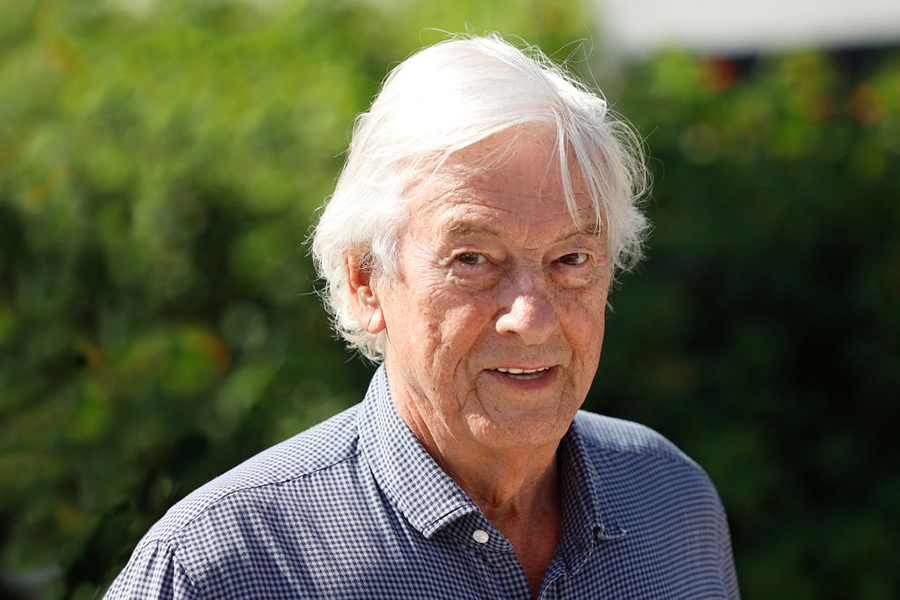Dutch film director Paul Verhoeven has turned 85. He stands among the greatest cinematic stars of his generation and is the eldest among them. In the 1980s and 1990s, he was closely associated with fellow filmmakers David Cronenberg from Canada and David Lynch from the United States. Together, they challenged Hollywood with their genre films and postmodern strategies. Cronenberg, now 80, and Lynch, 77, continue to work actively, defying their venerable age.
Verhoeven’s latest film, “Benedetta,” was released in 2021 and, true to form, sparked numerous discussions. This polarizing reaction echoes the reception of his very first film that gained worldwide fame, the audacious Dutch production “Turkish Delight” (1973), starring his favorite actor Rutger Hauer.
An intriguing detail in Verhoeven’s career is related to “Turkish Delight’s” French release. The infamous magazine “Charlie Hebdo” published the sole positive review, hailing the film as a masterpiece and prophesying international fame for Verhoeven. And indeed, it came to pass. This incident foreshadowed Verhoeven’s trajectory as a creator of remarkable films with a marginal status.
Despite facing setbacks in Hollywood (which, to be fair, was not unusual – consider the scathing reviews classic Alfred Hitchcock films received upon their initial release), and misunderstandings in his homeland, Verhoeven undoubtedly belongs in the pantheon of great directors. He is one of those cinematic masters for whom the art of filmmaking transcends mere entertainment; it is a means to convey profound messages about time, people, society, politics, ethics, and philosophy.
Thanks to postmodernism, cinema has become a unique mediator. European expatriates in Hollywood, such as Fritz Lang and Alfred Hitchcock, skillfully employed formal techniques, adopting a strategy of making seemingly harmless genre blockbusters – thrillers and noirs in the case of Lang and Hitchcock – that concealed provocative meanings and taboo subjects.
Verhoeven’s filmography consists of eighteen films, including historical dramas, science fiction action films, comedies, and two erotic thrillers. With rare exceptions (like “Showgirls,” which flopped at the box office but earned $100 million in video sales), they all became massive audience hits, featuring a powerful satirical edge. Perhaps, Paul Verhoeven is one of the few consistent satirists, along with Terry Gilliam.
It is unimaginable that films like “Starship Troopers” (1997), for instance, would be released on the big screens today. The adolescent science fiction action film about a war against alien bugs was simultaneously a pro-fascist movie, heavily referencing Leni Riefenstahl’s works. In the year of its release, “Starship Troopers” bewildered audiences, as America hadn’t engaged in warfare since the triumphant “Desert Storm,” but just a few years later, the US found itself deeply embroiled in Iraq and Afghanistan.
“Starship Troopers” – A Warning for America. Verhoeven seems to suggest that our American militarism will lead to no good,” commented actor Clancy Brown, who played one of the main roles in the film.
Or take “Showgirls” (1995) – a satirical comedy about showbiz morals, depicted through the lens of backstage life in erotic shows in Las Vegas. To rise to the top, a stripper with a dark past steps on everyone’s toes, and her next stop after Las Vegas is, of course, Hollywood.
Today, after the Harvey Weinstein scandal, where he is serving a 23-year sentence for sexual harassment of actresses, this critically panned film resonates more than ever. The unpleasant truth that big careers in showbiz are built on manipulation, violence, sexual exploitation, and crime is no longer a secret. Harassment in the entertainment industry, particularly in Hollywood, has always been a way of life.
It may seem unbelievable, but the 85-year-old director, who returned to Europe over twenty years ago, is now working in Hollywood again. Verhoeven’s next film will be “Young Sinner,” based on a script by Edward Neumeier, the writer of “RoboCop” and “Starship Troopers.” The main character is a woman who works for a powerful senator in Washington and finds herself entangled in international intrigues. We wait and hope that age will not hinder the master, just like Clint Eastwood, who continues to make films at the age of 92 and even acts in them.
Other films to watch:
“Soldier of Orange” (“Soldiers of the Queen,” 1977)
An adaptation of the memoirs of national hero and anti-fascist Eric Hazelhoff Roelfzema (Rutger Hauer). At that time, it became the most expensive Dutch film. The story follows five university friends who find themselves on opposite sides during World War II. Perhaps one of the least heroic war films, it depicts war as a destructive absurdity in which a group of peaceful intellectuals tries to survive at any cost. One of the key scenes is a tango at an officer’s party, danced by the heroes played by Rutger Hauer and Derek de Lint, both dressed in SS uniforms.
“Flesh + Blood” (1985)
Verhoeven’s first English-language film made before moving to Hollywood. It is a cynical yet romantic fantasy set in the Middle Ages, which prefigures “Game of Thrones” in many ways. Long before the concept of the “New Middle Ages” emerged (though Umberto Eco’s novel “The Name of the Rose” had already been written), Verhoeven equates the Dark Ages with the contemporary world, where the Enlightenment coexists with barbarism. The film is visually stunning, with Verhoeven’s regular cinematographer, Jan de Bont, drawing inspiration from the great Dutch painters. And, as is often the case in Verhoeven’s films as a model family man and father of three, it contains many explicit scenes.
“RoboCop” (1987)
An exemplary action film and Verhoeven’s first major success in Hollywood, which seemed to require no special introduction. At the time, the film was a hit on pirate VHS tapes and even managed to be shown in the last train of the dying Soviet film distribution. In recent times, it received a remake that would have been better off not existing. The difference between the original “RoboCop” and the 2014 remake by José Padilha vividly demonstrates the contrast between good and bad cinema. Apart from its dynamic pace, colorful characters, and newsreel inserts driving the story forward, Verhoeven’s film raises questions about the human essence of a being who retains only his face and brain, with the rest turned into a machine – and he even walks on water, as befits the resurrected.
“Black Book” (2006)
The story of Jewish girl Rachel Stein (future “Game of Thrones” star Carice van Houten) trying to survive during the occupation was originally planned as one of the storylines in “Soldier of Orange.” In the end, it became a separate film, marking Verhoeven’s triumphant return to his native Netherlands. Incredibly captivating, flawless in form, and, as always, highly controversial in content, “Black Book” deals with the not-so-pleasant subjects of the cooperation of the Dutch with the Nazis, including their involvement in the Holocaust, equating the cruelty of the Resistance fighters with that of the Nazis.
Source: The Gaze







